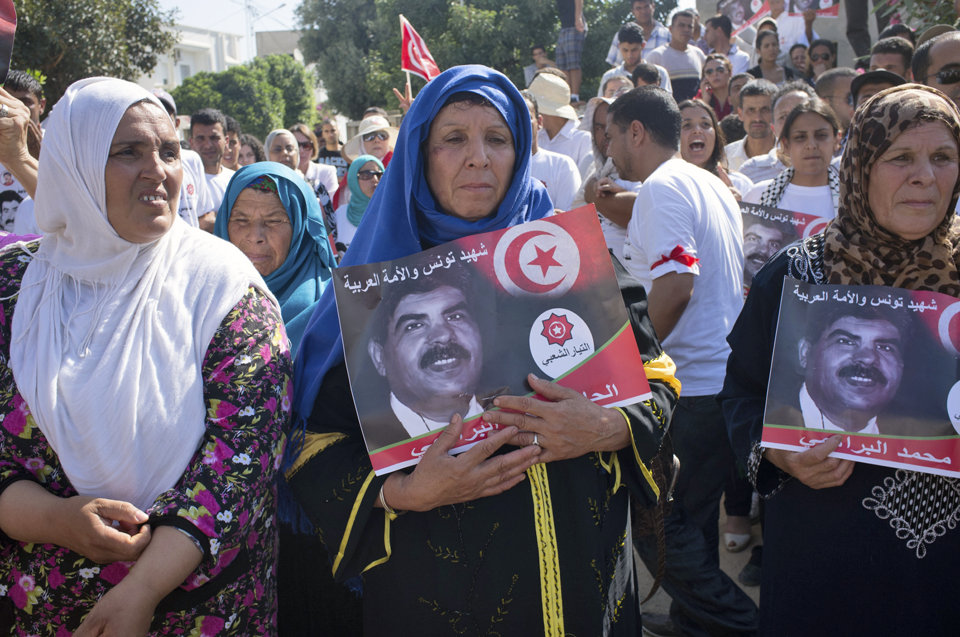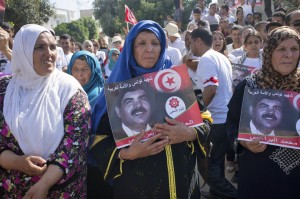


 Thousands of protesters chanting anti-government slogans joined a funeral march to lay to rest an assassinated Tunisian opposition politician, a display of the anger threatening the survival of a government once seen as a model in the region for the transition to democracy.
Thousands of protesters chanting anti-government slogans joined a funeral march to lay to rest an assassinated Tunisian opposition politician, a display of the anger threatening the survival of a government once seen as a model in the region for the transition to democracy.
Adding to the tension, a bomb exploded in the early morning underneath a car at the port in Tunis outside a police station. Though there were no injuries, the rare attack helped deepen the sense of unease in in the North African country, where two opposition politicians have been gunned down in the last six months, apparently with the same gun.
Mohammed Brahmi’s coffin was carried by soldiers to Jellaz cemetery and buried next to Chokri Belaid, a fellow politician who was killed in February. Brahmi’s widow, five children and the army chief of staff accompanied the coffin on its route through the capital.
“Down with the party of the Brotherhood,” chanted mourners, referring to the ruling Ennahda Party’s affiliation with the regional Muslim Brotherhood religious group. “The people demand the fall of the regime.”
The latest assassination Thursday has exacerbated the distrust between the ruling coalition led by moderate Islamists and the opposition, which has demanded the dissolution of the government because of its failures to rein in Islamist extremists, turn around the economy and manage the transition to democracy.
Speaking next to the grave, activist lawyer Nacer Laouini called on army chief of staff Gen. Mohamed Salah Hamdi to protect the people from the Islamists — a clear reference to the military coup in Egypt against the elected Islamist government.
“The head of the army is here, we ask the army to be on the side of the people as it always has been and protect Tunisians against Ennahda,” he said.
Tunisia’s army, however, has shown little interest to involve itself in politics up until now, unlike its Egyptian counterpart.
The crowd sang the national anthem several times and there was strong emotion in the crowd. But there were nowhere near the hundreds of thousands that came out for Belaid’s funeral in February.
Temperatures in Tunis at midday were a blazing 35 degrees (95F) and the funeral took place during the fasting month of Ramadan, when most Tunisians don’t eat or drink during daylight hours.
The assassination has rocked the country and provoked anti-government demonstrations by protesters holding the moderate Islamists elected in 2011 responsible for the lack of security in the country.
Late Friday, a 48-year-old political activist with the same leftist coalition as the assassinated Brahmi died after being hit in the head by a tear gas canister during a demonstration outside a police station in the southern mining town of Gafsa.
The Interior Ministry, citing physical evidence and witnesses, said Friday that Brahmi’s assassin was Boubakr Hakim, a known militant and weapons smuggler who was part of the same al-Qaida linked cell that murdered Belaid back in February.
Hakim allegedly shot Brahmi 14 times outside his home Thursday in full view of his family with the same 9mm semi-automatic handgun used to kill Belaid, before he sped away on the back of a moped.
The Saturday morning bomb blast caused no injuries and only blew out windows in the area but it represents a dangerous escalation for a country that has yet to experience serious terrorist incidents like its neighbors Algeria and Libya.
“As we were leaving the station for a routine patrol, we saw a suspicious package under the car,” said police officer Mourad Mliki told The Associated Press. “We went back to the station to tell our superiors and there was a huge explosion — it was set off remotely.”
Mohammed Ali Aroui, the police spokesman told the state news agency that the remains of the explosive device were being examined by a special team.
“The explosion was so strong it was like an earthquake,” said Walid Khammar, a fish seller living near the police station whose car was damaged by the blast.
Tunisians overthrew their dictator in January 2011, inspiring the pro-democracy uprisings of the Arab Spring across the region. The long-repressed Ennahda dominated subsequent elections and now rules in coalition with two secular parties.
With two political assassinations and a faltering economy, the opposition says the government has lost its legitimacy and is demanding a new government.
Some 42 members of opposition parties announced late Friday their withdrawal from the 217-member elected assembly charged with completing the countries new constitution.
The opposition accuses Ennahda of turning a blind eye to the rise of ultraconservative Islamist movements known as Salafis, following the revolution — especially those willing to use violence to push their views.
The government had said it did not want to replicate the repressive anti-Islamist policies of overthrown dictator Zine El Abidine Ben Ali but when thousands of salafis attacked the U.S. embassy in September over an anti-Islamic film produced in the U.S., the government cracked down on the movement.
In April, soldiers patrolling in a mountainous region near the Algerian tripped a roadside bomb causing severe injuries and sparking a search of the region that revealed the remains of training camps and more hidden explosives.
-AP






